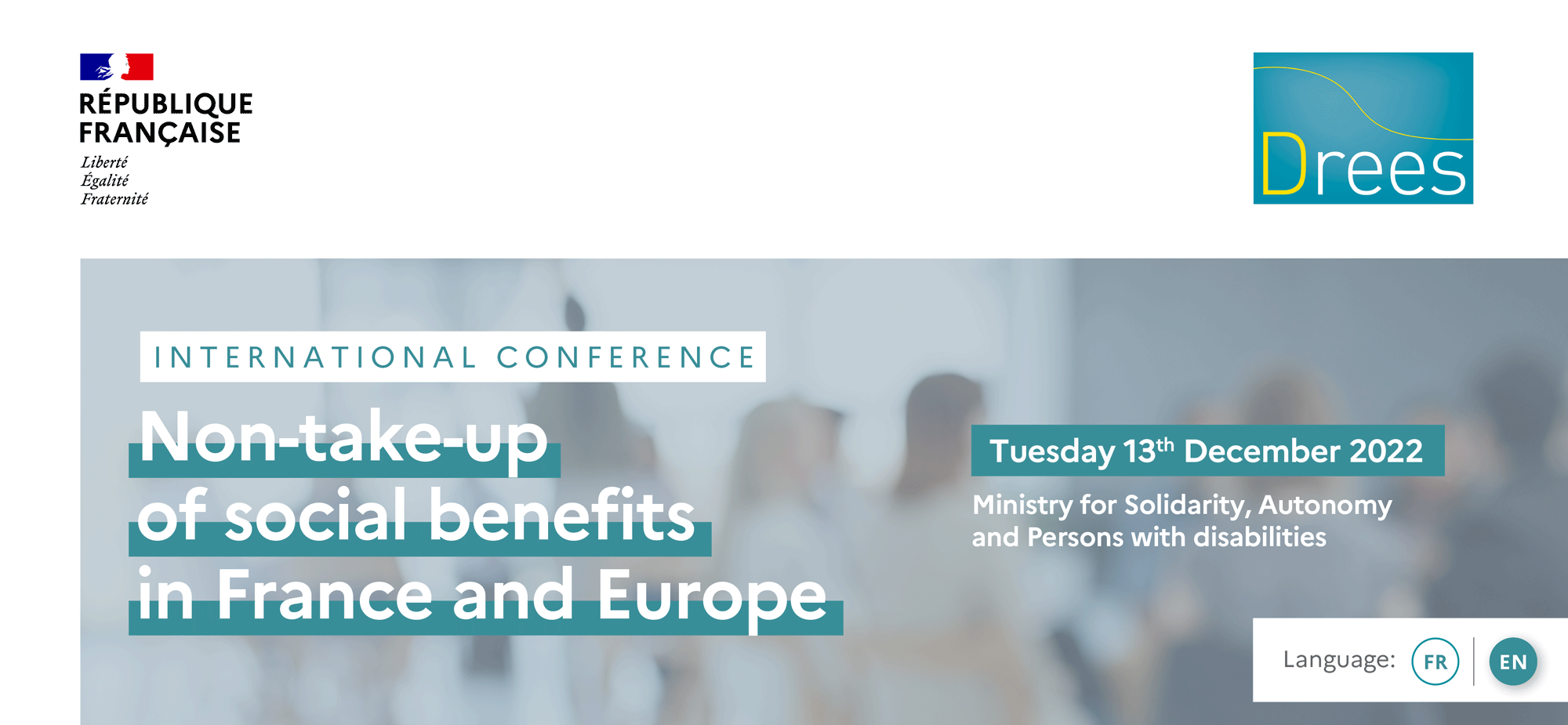
|
||||||
|
|
| PROVISIONAL PROGRAMME | |||
| Animator: Régis de Closets, journalist | |||
| 8:30 > 9:30 | Coffee reception |
||
| 9:30 > 10:00 | Opening of the conference • Marine Jeantet, Interministerial Delegate for the Prevention and Fight against Poverty (France) • Fabrice Lenglart, Director, Directorate for Research, Studies, Evaluation and Statistics (DREES) (France) |
||
| Introductory overview Recent contributions from the national public statistical service on the extent, the profiles concerned and the factors determining non-take-up |
|||
| 10:00 > 11:15 | This first introductory session aims to review the definition of non-take-up and to present the most recent results produced by the national public statistical service. Based on a selection of studies on various social benefits, this first session illustrates the extent of the phenomenon of non-take-up in France and in Europe and provides keys to understanding the principal determinants and populations concerned. List of studies presented:
Questions and answers (Q&A) |
||
| Plenary 1 Quantifying non-take-up in its different dimensions: complementary approaches to understanding non-take-up |
|||
| 11:15 > 12:30 | During this panel discussion, four specialists in the issue of non-take-up of social benefits will describe the different methods for measuring this phenomenon. The use of information from administrative data to identify access to social rights or not is questioned, like the interest of conducting more specific surveys. This panel is also an opportunity to remind the interest of work on particular populations such as those followed by Secours catholique or local insights on non-take-up. Questions and answers (Q&A) |
||
| 12:30 > 14:00 | Lunch (Lunch is free for participants) |
||
| 14:00 > 14:05 | Opening of the afternoon sessions Olivier de Schutter, Special Rapporteur on extreme poverty and human rights, author of the report: "Non-take-up of rights in the context of social protection" |
||
| Plenary 2 Figures, and afterwards? Issues and uses of non-take-up statistics |
|||
| 14:05 > 15:30 | This second panel discussion will focus on the uses made of figures on non-take-up and their reception by the public authorities. Depending on the country, they can be used in different ways, either to legitimise action plans to fight against non-take-up. Whether in France, Spain, the Netherlands or Switzerland, the identification of the phenomenon of non-take-up leads to the implementation of solutions to resolve this problem. However, there is sometimes resistance from administrations faced with this new phenomenon, which has been "unthought of" by the designers of social policies. Speakers: • Ana Isabel Guzmán de Torres, Deputy director general in charge of social inclusion objectives and indicators, Ministry of Inclusion, Social Security and Migration (Spain) • Bert Van Putten, Director General of the Centre for Social Evaluation (KWIZ) (Netherlands) • Eric Crettaz, Professor, University of Applied Sciences Western Switzerland (Switzerland) • Clara Deville, Research Fellow in Sociology, UMR CESAER, National Research Institute for Agriculture, Food and the Environment (France) Questions and answers (Q&A) |
||
| Plenary 3 Perspectives of public action to fight against non-take-up |
|||
| 15:30 > 17:00 | This last panel discusses the prospects for public action in the fight against non-take-up. Solutions are frequently proposed: automation of access to rights, simplification of procedures, digitalization of procedures, use of Big Data to better identify potential recipients, and "outreach" to reach out to distant groups. But are these actions always as beneficial to the take-up of benefits? What are the conditions for their success? In the perspective of the implementation of a "Solidarité à la source" and the "territoires zéro non-recours" experiments, this reflection appears essential. Speakers: • Fabrice Lenglart, Director of DREES and former General Rapporteur of the Revenu Universel d’activité (RUA) [France] • Fran Bennett, Department of Social Policy and Intervention, University of Oxford • Sandrine Runel, Deputy Mayor of Lyon in charge of solidarity and social inclusion, Vice-President of the CCAS of Lyon • Daniel Agacinski, General Delegate for Mediation, Defender of Rights (France) • Jerôme Lepage, Deputy Director of Family Policies, French National Family Allowances Fund (CNAF) [France] Questions and answers (Q&A) |
||
| 17:00 > 17:30 | Closure Jean-Christophe Combe, Minister for Solidarity, Autonomy and Persons with disabilities |
||

|
| Copyright © 2022 Ptolémée. |